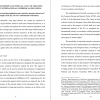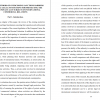Тема: International economic sanctions as barriers in international private law relations and how to overcome them through the protection of rights
Закажите новую по вашим требованиям
Представленный материал является образцом учебного исследования, примером структуры и содержания учебного исследования по заявленной теме. Размещён исключительно в информационных и ознакомительных целях.
Workspay.ru оказывает информационные услуги по сбору, обработке и структурированию материалов в соответствии с требованиями заказчика.
Размещение материала не означает публикацию произведения впервые и не предполагает передачу исключительных авторских прав третьим лицам.
Материал не предназначен для дословной сдачи в образовательные организации и требует самостоятельной переработки с соблюдением законодательства Российской Федерации об авторском праве и принципов академической добросовестности.
Авторские права на исходные материалы принадлежат их законным правообладателям. В случае возникновения вопросов, связанных с размещённым материалом, просим направить обращение через форму обратной связи.
📋 Содержание
CHAPTER 1. ECONOMIC SANCTIONS AS A WAY OF CREATING BARRIERS IN INTERNATIONAL COMMERICAL RELATIONS 9
Part 1. The current sanctions legislation and restrictive measures based on it (on the example of the EU, the USA and Russian Federation) 9
Part 2. The impact of economic sanctions on international commercial legal relationships and the legal barriers created in this regard 22
CHAPTER 2. METHODS OF OVERCOMING SANCTIONS BARRIERS ANDPOSSIBLE LEGAL INSTITUTIONS FOR PROTECTING THE RIGHTS OFPRIVATE LAW SUBJECTS IN INTERNATIONAL COMMERCIAL RELATIONS 29
Part 1. Introduction 29
Part 2. Local courts - on the example of arbitration courts of the Russian Federation 31
Part 3. Supranational (regional) courts - on the example of the Court of Justice of the European Union 36
Part 4. European Court of the Human Rights 40
Part 5. International Commercial Arbitration 45
Part 6. International Investment Arbitration 56
Part 7. Conclusion 61
CHAPTER 3. A GLIMPSE INTO THE FUTURE - HOW THE RESTRICTIVEMEASURES WILL DEVELOP AND WHAT SOLUTIONS IN THE FIELD OF PROTECTING RIGHTS CAN BE SUGGESTED 64
CONCLUSION 75
REFERENCE LIST 79
📖 Введение
The topic of the work is characterized by a marked relevance, which is manifested in the following. For today, there is hardly a person who does not know or has not heard about economic sanctions. Indeed, nowadays sanctions and other special restrictive measures of economic nature have become an indispensable tool in the hands of the state, used for the purpose of external pressure on the political course of another state. Since 2014, the Russian Federation, its individuals and legal entities have been constantly at the center of the so-called "sanctions" attention of the United States of America, the European Union and other countries regarding the imposition of restrictive and coercive economic measures. Over time, the list of sanctions restrictions imposed on the Russian Federation is only increasing, and the types of sanctions imposed and the objects of such restrictions (banks, legal entities operating in a certain economic sector, etc.) are becoming more and more diversified. As of the beginning of 2024, according to the Castellum AI sanctions tracking database, the Russian Federation is considered to be the most "sanctioned" country - the number of active sanctions on individuals and legal entities, as well as sanctions against certain sectors of the economy (sectoral sanctions) is about more than 18,000.1 The majority number of sanctions against the Russian Federation were imposed in the period from February 2022 to the present. The Russian Federation is not left aside, which in response to financial and economic restrictions imposed on its citizens and legal entities, introduces retaliatory measures, referred to as "special economic measures to ensure the security of the Russian Federation" (also referred
1 Russia Sanctions Dashboard. Castellum AI Database. 2024 [Electronic Source] URL: https://www.castellum.ai/russia-sanctions-dashboard(Date of Address: 15.04.2024) to as "counter-sanctions"), against "unfriendly" countries, the list of which is regulated by the Order of the Government of the Russian Federation No. 430-r dated 05.03.2022. For example, according to this legal act, the countries committing unfriendly acts include the United States of America, Great Britain, European Union countries, Norway, Switzerland and other countries.
Sanctions restrictions imposed by states often initially target certain individuals or entities associated with the target state, important economic assets and entire sectors of the economy that generate large revenues for the target state. However, sanctions (or counter-sanctions) directly or indirectly affect the activity of subjects of international private law relations, in particular entities involved in international commercial turnover in the sale of goods and services. In this regard, the factor of existing sanctions restrictions is now almost always a subject of discussion between the parties to international commercial turnover during negotiations in the course of a deal on the international sale of goods or provision of services. Sanctions measures affect not only the possibility of acquiring a particular product, but also on logistics, payment and delivery of goods, and coordination of other legal issues. The issue of protecting the rights of those whose rights are violated and whose commercial interests and interaction in international commercial turnover are directly or indirectly affected by the existing sanctions restrictions is also vital....
✅ Заключение
In this connection, the question of researching the possibility of protecting the rights and legitimate interests of private entities in case their activities in the field of international commercial turnover are significantly influenced by the imposed restrictive and form obstacles to the proper implementation of such activities remains topical and important. Based on the results of the research and analysis conducted in the framework of the topic of this paper, taking into account the previously set goals and objectives, the following findings and conclusions can be presented:
1. The existing legal regulation of the regimes of restrictive economic measures, their content, scope of application and types, as well as the mechanisms of introduction, application and expansion of possible restrictive economic measures were analyzed on the example of the legislation of the European Union, the United States of America and the Russian Federation (in the context of retaliatory economic measures). Based on the results of the analysis, it was found that the existing sanctions measures and retaliatory measures imposed by the above-mentioned jurisdictions are wide-ranging and cover a broad spectrum of different economic sectors and services. Moreover, the mechanism of application of restrictive economic measures has a well-developed legal and procedural framework, as well as has a certain flexibility, which allows to promptly supplement and change the list and types of restrictive measures.
2. At the same time, the procedures for imposing sanctions on target states and its individuals/legal entities often directly or indirectly affect relations in the field of international commercial turnover in general, or, more precisely, the interaction within the framework of such turnover between entities, one of which may be located in the jurisdiction under sanctions. The imposition of restrictive economic measures by a country or supranational organization may create legal barriers to the private entity’s business activities in international commercial relations, in particular with international counterparties. It has been analyzed that such barriers may include not only problems in the proper performance of contractual obligations with international partners in the field of international commercial activities (e.g., inability to deliver the goods, inability to pay for the goods or services, etc), but also the general inability to carry out any business activity in the field of international commercial turnover due to the imposed sanctions restrictions. Thereby, there is a possible threat of violation of the rights and legitimate interests of private entities who are the subjects to international commercial turnover relation. In this regard, there is an existing request for private entities to apply to the relevant rights protection authorities for protection of their rights and interests...





